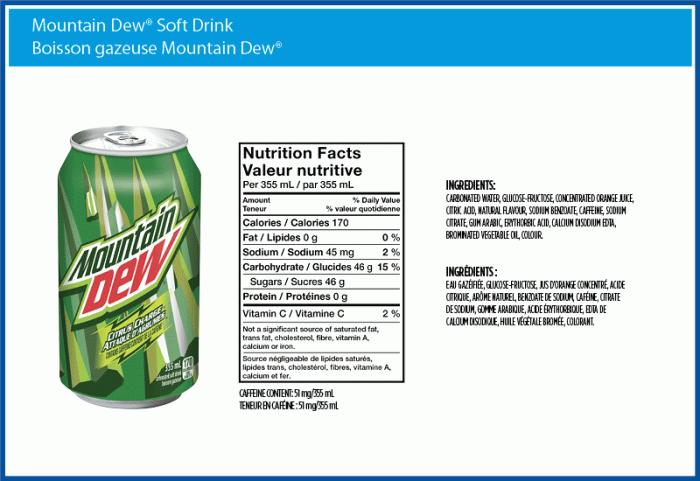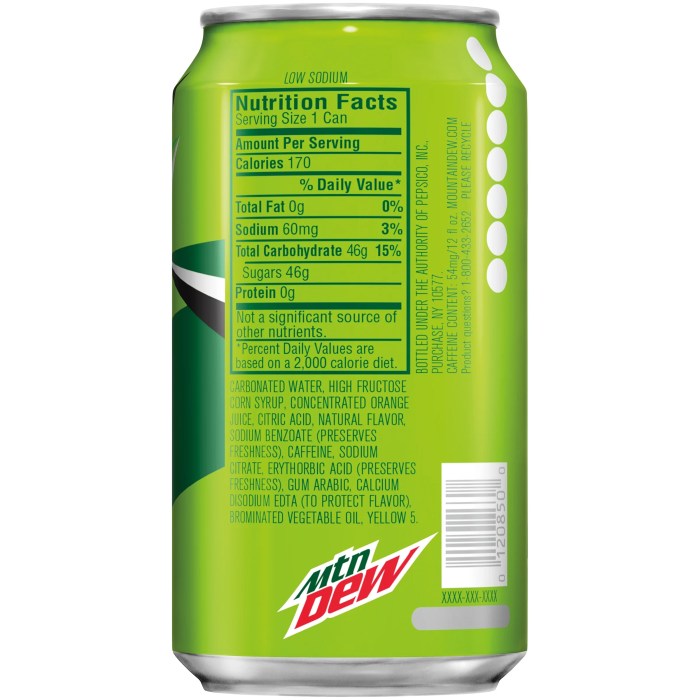Mountain Dew Ingredients & Their Nutritional Impact

Mountain dew nutrition facts label – Mountain Dew’s distinct flavor and high energy profile stem from a specific blend of ingredients. Understanding their individual roles provides insight into the drink’s overall nutritional impact, both positive and negative. This section will explore the major components, their contribution to the nutritional profile, and variations across different Mountain Dew flavors.
Major Ingredients and Their Roles
The primary ingredients in Mountain Dew significantly influence its nutritional content. High fructose corn syrup is a major source of carbohydrates and contributes significantly to the drink’s sweetness and caloric density. Carbonated water provides the fizz and volume. Citric acid acts as a preservative and provides tartness, balancing the sweetness. Caffeine provides a stimulant effect, increasing alertness and energy levels.
Artificial flavors and colors contribute to the characteristic Mountain Dew taste and appearance. These ingredients, in their specific proportions, determine the overall nutritional makeup.
Carbohydrate, Fat, and Protein Breakdown
Mountain Dew is primarily composed of carbohydrates, with minimal to no fat or protein. The carbohydrates are predominantly simple sugars, derived mainly from high fructose corn syrup. This high sugar content contributes to the drink’s high caloric density and rapid absorption into the bloodstream, leading to a quick energy boost followed by a potential energy crash. The negligible fat and protein content means Mountain Dew offers little nutritional value beyond the carbohydrates and caffeine.
Nutritional Content Comparison Across Flavors, Mountain dew nutrition facts label
While the core ingredients remain consistent across various Mountain Dew flavors (Original, Code Red, Voltage, etc.), slight variations exist in the specific proportions and the addition of other ingredients to achieve unique flavor profiles. These variations can lead to minor differences in the overall nutritional content, particularly in terms of sugar content and caloric density. For example, a flavor enhanced with fruit juice might contain slightly more natural sugars and fewer artificial sweeteners.
However, these differences are generally small and the overall nutritional profile remains similar across most varieties.
Understanding the Mountain Dew nutrition facts label is crucial for mindful consumption. It’s interesting to compare its sugar content, for instance, to the nutritional profile of other popular foods; for example, checking out the nutrition facts for bacon highlights a stark contrast in fat and protein content. Returning to Mountain Dew, the label also details the caffeine levels, which is another key factor to consider alongside the sugar content.
Nutritional Information for Various Serving Sizes
| Serving Size (oz) | Calories | Total Carbohydrate (g) | Sugars (g) |
|---|---|---|---|
| 12 | 170 | 46 | 46 |
| 16 | 227 | 61 | 61 |
| 20 | 284 | 77 | 77 |
Note
These values are approximate and can vary slightly depending on the specific flavor and manufacturing process. Consult the individual product packaging for the most accurate nutritional information.
Nutritional Comparison with Other Beverages

Mountain Dew, like many carbonated soft drinks, occupies a distinct space in the beverage landscape. Understanding its nutritional profile requires comparing it to both similar and dissimilar drinks to appreciate its strengths and weaknesses. This comparison will highlight the differences in key nutritional components, offering a clearer picture of Mountain Dew’s place within the broader beverage market.
Analyzing Mountain Dew against other beverages reveals significant variations in sugar, caffeine, and other nutritional aspects. This section will directly compare Mountain Dew to other carbonated soft drinks and healthier alternatives, using both textual descriptions and a visual representation to illuminate these differences.
Comparison with Other Carbonated Soft Drinks
Mountain Dew’s high sugar and caffeine content are typical of many carbonated soft drinks, though its caffeine level might be higher than some competitors. Other colas and citrus-flavored sodas often contain similar levels of sugar, providing comparable caloric density. However, the specific formulation of each beverage results in slight variations in the exact amounts of these components and the inclusion of artificial sweeteners or flavors.
For example, while both Mountain Dew and Coca-Cola are carbonated soft drinks, their exact sugar and caffeine content differ slightly due to differences in their recipes. Diet versions of these drinks typically substitute sugar with artificial sweeteners, drastically reducing caloric and sugar content but potentially introducing other considerations.
Comparison with Healthier Beverage Alternatives
In contrast to carbonated soft drinks, healthier alternatives such as water, fruit juice, and tea offer significantly different nutritional profiles. Water, naturally, contains zero calories, sugar, and caffeine. Fruit juices, while containing natural sugars and vitamins, often lack the high caffeine levels found in Mountain Dew. Tea, depending on the type and preparation, can offer antioxidants and other beneficial compounds, while being relatively low in calories and sugar, but may contain caffeine depending on the variety.
The significant difference lies in the absence of added sugars and artificial ingredients commonly found in Mountain Dew.
Visual Representation of Nutritional Differences
Imagine a bar graph with four bars representing Mountain Dew, Coca-Cola, Orange Juice, and Water. The horizontal axis labels each beverage, and the vertical axis represents the quantity of sugar (in grams), caffeine (in milligrams), and calories (in kilocalories) per serving. The Mountain Dew bar would be noticeably taller than the others for sugar and caffeine, reflecting its higher content in these components.
The Coca-Cola bar would show a similar, though potentially slightly lower, level of sugar and caffeine. The Orange Juice bar would be significantly shorter than Mountain Dew for caffeine, but moderately tall for sugar and calories, representing its natural sugars. Finally, the Water bar would be very short, near zero, for all three components, emphasizing its lack of added sugars, caffeine, and calories.
Comparative Table of Beverage Nutritional Information
| Beverage | Sugar (g) (per serving) | Caffeine (mg) (per serving) | Calories (kcal) (per serving) |
|---|---|---|---|
| Mountain Dew | ~46 | ~55 | ~170 |
| Coca-Cola | ~39 | ~34 | ~140 |
| Orange Juice | ~20 | ~0 | ~110 |
| Water | 0 | 0 | 0 |
Expert Answers: Mountain Dew Nutrition Facts Label
Does Mountain Dew contain artificial sweeteners?
Most Mountain Dew varieties do not contain artificial sweeteners; their sweetness comes primarily from high fructose corn syrup and sugar.
Is Mountain Dew suitable for children?
Due to its high sugar and caffeine content, Mountain Dew is generally not recommended for children. Healthier alternatives are preferable.
Are there any diet versions of Mountain Dew?
Yes, some diet versions of Mountain Dew exist, typically using artificial sweeteners to reduce sugar content. However, these still contain caffeine.
What are the long-term effects of regularly consuming Mountain Dew?
Regular consumption of Mountain Dew can contribute to weight gain, increased risk of type 2 diabetes, dental problems, and other health issues due to its high sugar and caffeine content.
